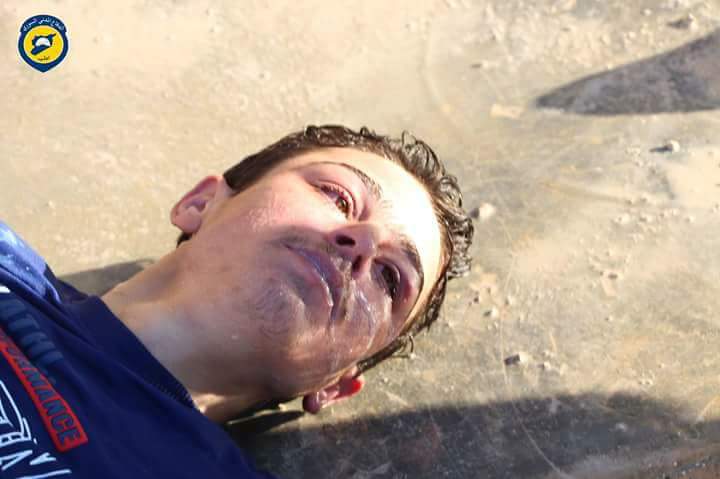
'A hospital treating the victims of an alleged chemical weapons attack in Syria has reportedly bombed. At least 58 people including 11 children were reported dead after the initial attack on the rebel-held town of Khan Sheikhoun. Doctors said victims started to choke, vomit and faint with foam coming out of their mouths, showing symptoms of possible sarin gas exposure. Pin-point pupils and a lack of the odour associated with more commonly used chlorine gas was among the evidence cited for the nerve gas, which is banned as a weapon of mass destruction under international law.
Turkey opened its border crossing at Reyhanli to allow victims through for treatment, with graphic footage showing convulsing and choking patients being doused with water and loaded into ambulances. Rescue workers from the White Helmets group were seen wearing gas masks to protect themselves while treating people lying amid rubble on the ground. Activists posted video online claiming to show the moment the bombs struck, alleging they were dropped by Syrian air force helicopters as clouds of smoke rose into the air.
It came little over a week after another alleged chemical attack hit a hospital in the town of Latamneh, just 14 miles away. Médecins Sans Frontières (MSF), which supports the facility, said a bomb dropped by a helicopter struck the entrance on 25 March.
“Immediately after the impact, patients and staff reported suffering severe respiratory symptoms and burning of mucous membranes – symptoms consistent with an attack using chemicals,” a spokesperson said.
The hospital’s orthopaedic surgeon was among two people killed in the attack, leaving just two orthopaedic surgeons for a population of around 120,000 people, and the clinic was put out of service for three days.
“Bombing hospitals, although banned by international humanitarian law, remains common practice in Syria, and health services are severely affected by these repeated attacks,” said Massimiliano Rebaudengo, MSF’s head of mission in northern Syria.
Over the past year, the charity has received reports of at least 71 attacks on 32 different health facilities it runs or supports in Syria.
“Bombing hospitals, although banned by international humanitarian law, remains common practice in Syria, and health services are severely affected by these repeated attacks,” said Massimiliano Rebaudengo, MSF’s head of mission in northern Syria.
Over the past year, the charity has received reports of at least 71 attacks on 32 different health facilities it runs or supports in Syria.
Bashar al-Assad's forces have been accused of repeatedly using the nerve agent during the six-year civil war, including in a massacre in Eastern Ghouta that almost sparked military intervention by the UK in 2013. A report by the UN's Organisation for the Prohibition of Chemical Weapons released last year concluded that Syrian government forces were responsible for three examined chemical attacks but China and Russia have vetoed sanctions.
Khan Sheikhoun sits near the frontline between regime and opposition held territory, on a key motorway linking the city of Hama with rebel strongholds to the north. The alleged chemical attack came as world leaders gathered in Brussels for a conference organised by the EU and UN on “supporting the future of Syria”. Successive rounds of peace talks in Geneva have so far failed to produce a lasting ceasefire in the Syrian conflict, which shows no sign of ending in its seventh year of bloodshed.'
Khan Sheikhoun sits near the frontline between regime and opposition held territory, on a key motorway linking the city of Hama with rebel strongholds to the north. The alleged chemical attack came as world leaders gathered in Brussels for a conference organised by the EU and UN on “supporting the future of Syria”. Successive rounds of peace talks in Geneva have so far failed to produce a lasting ceasefire in the Syrian conflict, which shows no sign of ending in its seventh year of bloodshed.'
'Another airstrike just now on Khan Sheikhoun. Friend there: "Pray for us. Tell the world the children of Khan Sheikhoun suffocated to death" '
[https://twitter.com/Elizrael/status/849212015868600321]
[https://twitter.com/Elizrael/status/849212015868600321]

No comments:
Post a Comment